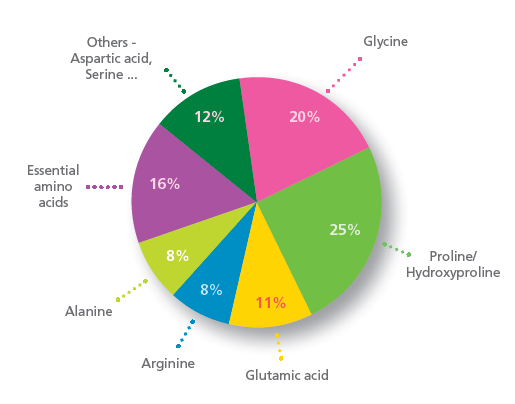References please? I’m wondering how good the data is on this…
Low-molecular-weight collagen peptides (Geltech Co., Ltd., Busan, Korea), the test product, are classified as food supplements. It contains collagen peptides purified from fish scale collagen originating from tilapia (Oreochromis genus) gelatin. First, fish gelatin is hydrolyzed with an enzyme, followed by multiple purification processes with pulp, car- bon, and cartridge filters. Then, low-molecular-weight (av- erage molecular weight £1000 Da) collagen peptides with an average particle size of 50–150lm are obtained by sterilization, drying, and sieving. A single tablet of the test product contained 500 mg of low-molecular-weight collagen peptides, which is equivalent to 58.52% of tablet weight.
Traditionally, collagen and collagen- derived products have been obtained from mammalian source, such as bovine or porcine. Recently, low-molecular- weight collagen peptides derived from marine-based mate- rials have provided alternative sources of natural collagen.19 High-molecular-weight collagen peptides decompose in the stomach quickly and do not reach to the skin. Other research on low-molecular-weight collagen peptides demonstrated effective skin moisturizing and antiwrinkle properties.19 Collagen nanofibers derived from biomimetic tilapia showed a skin regeneration effect in vitro by inducing keratinocytes differentiation and facilitating collagen fiber synthesis in human dermal fibroblasts.12,13,20 Furthermore, oral administration of tilapia collagen peptides increased transforming growth factor beta receptor I and procollagen type 1 expression in the skin of UVB-induced damaged hairless mice.12,21
Collagen is the major protein of connective tissues and the most abundant protein of animal origin [1] - [3] . For industrial purposes, collagen is extracted mainly from skins and bones of cattle and pigs skins and has been widely used in the pharmaceutical, food, healthcare, and cosmetic industries [4] [5] . However, the incidence of diseases such as bovine spongiform encephalopathy (BSE or the popular “mad cow”), and foot and mouth disease has raised concerns about safe use of animal proteins. In addition, the collagen extracted from pigs cannot be used due to religious barriers. For this reason, interest in alternative sources of collagens, which present no health and social risks, has expanded [6] . The other source found for collagen extraction includes skin, bone, fin and scales of fresh water and marine fish, chicken skin, bull frog skin, squid skin, octopus arms and marine sponge [7] - [9] . Among collagen alternatives, fish provided the best source of raw material because of its high availability, no risk of disease transmission, and no religious barriers [10] . Collagens from fish skin or swim bladders which are the waste products in fish processing, may be good substitutes, because of their safety and solubility in neutral salt solutions and dilute acids. Fish collagen is absorbed up to 1.5 times more efficiently into the body, meaning that it has superior bioavailability over bovine or porcine types. Because it is absorbed more efficiently and enters the bloodstream more quickly, it is considered to be the best source of collagen for pharmaceutical applications. Moreover, 75% of the total weight of fish is discarded as wastes in the form of skins, bones, fins, heads, guts, scales and bladder during processing [11]
As far as I can tell, the sources you give provide neither evidence nor citations to papers containing evidence to support the claims re bioavailability. Do you know what the experimental basis for those are?
It may be more highly absorbed but since marine collagen costs two to four times as much as regular hydrolyzed collagen on Amazon, I don’t see any particular benefit. Since some users of regular hydrolyzed collagen are using it for protein and glycine content, I don’t think the marine collagen is worth the extra money.
Even if marine collagen is potentially more bioavailable, I wonder how much of this comes with PFAS.
Not to say that bovine collagen would be completely PFAS free, but still PFAS in fish is a known issue.
It may be that Meiji Seika Kaisha, Ltd funded the research
Be careful with taking so much collagen. There is too much of a good thing with anything.
Hydroxyproline in collagen breaks down into oxalate, which can increase the risk of kidney stones and cardiovascular disease. In my opinion, 60 grams of collagen is too much.
Also, collagen is not considered a good protein source because it’s low in essential amino acids and is mostly glycine and proline/hydroxypline, and therefore should not replace non-collagen protein.
So for that reason, Chris Masterjohn recommends that you not count collagen as part of your protein requirement, but in addition to your protein requirement.
The amount of collagen one needs to take, according to Chris Masterjohn, is 10-20% of your non-collagen protein requirement. So if you eat 100g of non-collagen protein, you can take 10-20g of collagen.
Lastly, if you’re only getting 60g of non-collagen protein, it may not be enough for your body size/activity level.
Does anyone have a sense of % ranges of glycine in marine collagen?
The one I am using has this amino acid composition.

Haha well if Masterjohn says so…
No reason not to include collagen in your total protein providing you are achieving the required amount of essential amino acids which I do via my normal diet (eggs, nuts, small portions of meat).
Is collagen protein optimal for muscle hypertrophy? No, it’s low in Leucine. Is it superior to whey and animal protein for longevity? The evidence regarding methionine restriction and glycine supplementation suggest it is.
Sorry if I missed it, which one are you taking?
Peptan. https://peptan.com/
There are many manufacturers using their collagen peptides in their collagen preparations.
An introduction to a few perspectives an ECM as a target for interventions for longevity, By Colin Ewald The King of Collagen - (research)
For my fellow rock climbers…
It’s a better bet than vitamin I which was all the rage when I got into rock climbing. (Ibuprofen).
I have noticed that collagen gives my skin a firmer texture… Almost a bit ‘grainier’ is the way I would describe it. It’s probably a positive?
It’s tough to keep up. Today you hear that a supplement is the best thing since sliced bread. Tomorrow you hear that it’s not good for you.
